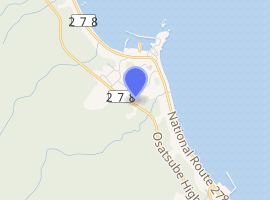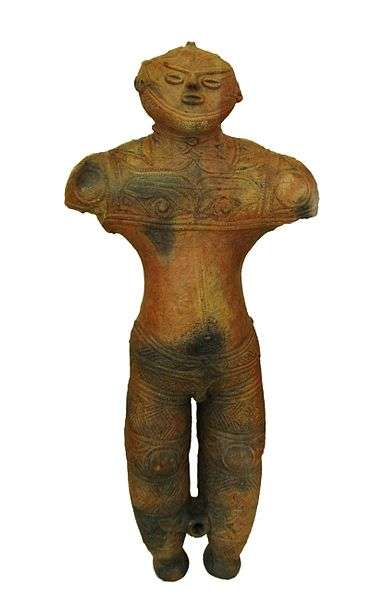Hakodate Jōmon Culture Center
Hakodate Jōmon Culture Center (函館市縄文文化交流センター, Hakodate Jōmon Bunka Kōryū Senta—) opened in Hakodate, Hokkaidō, Japan in 2011. It has four exhibition rooms dedicated to the Jōmon period, displaying some 1,200 pieces of earthenware and stoneware excavated in Hakodate as well as the only National Treasure in Hokkaidō, the so-called "Hollow Dogū" (中空土偶), excavated from the Chobonaino Site (著保内野遺跡) (designated in 2007). Hands-on activities, including magatama-making and "angin (編布)-knitting", are also available. The museum is located at Michi no Eki Jōmon Roman Minamikayabe (道の駅縄文ロマン 南かやべ), making this the only roadside station in Japan with a museum with a National Treasure.[1][2][3]
| Hakodate Jōmon Culture Center | |
|---|---|
函館市縄文文化交流センター | |

| |
| General information | |
| Address | 551-1 Usujiri-chō |
| Town or city | Hakodate, Hokkaidō |
| Country | Japan |
| Coordinates | 41°55′40″N 140°56′42″E |
| Opened | 1 October 2011 |
| Website | |
| Official website | |
Gallery
gollark: ... citizenship?
gollark: No it's not, it's two syllables vs one.
gollark: So why is "hodl" a better descriptor than just... "hold"?
gollark: Ah yes, of course.
gollark: what is hodl?
See also
References
- "Facility Information". Hokkaido Jomon Culture Center. Retrieved 2 September 2019.
- 施設管理・運営 [Facility Management and Operation] (in Japanese). Southern Hokkaido History and Culture Foundation. Retrieved 2 September 2019.
- 土偶/北海道函館市著保内野遺跡出土 [Dogū, Excavated From the Chobonaino Site in Hakodate, Hokkaidō] (in Japanese). Agency for Cultural Affairs. Retrieved 2 September 2019.
This article is issued from Wikipedia. The text is licensed under Creative Commons - Attribution - Sharealike. Additional terms may apply for the media files.
